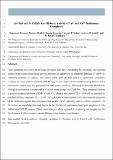In vitro and in cellulo anti-diabetic activity of AuI- and AuIII-isothiourea complexes
Abstract
About 100 million people worldwide have type II diabetes (T2D), making it one of the most common metabolic disease. DPP-IV inhibitors are new class of anti-diabetic drug. Gold complexes are known for diverse biological activities. Considering these precedents, and growing interest in developing metal-based enzyme inhibitors, we report here the dipeptidyl peptidase-IV (DPP-IV) inhibitory potential of cationic, and neutral chiral gold (I), and gold (III) isothiourea complexes. Colorimetric assay with recombinant DPP-IV enzyme was employed for initial screening. Kinetic based mechanistic studies were also performed for most active complexes. Efficiency of identified inhibitors in biological environment was assessed in in cellulo assay, using Caco-2 cell line. These complexes showed a good to moderate inhibition of DPP-IV with IC50 values in the range of 22.0 – 99.0 µM, as compared to standard inhibitor, sitagliptin (IC50 = 0.033 ± 0.04 µM). It was observed that steric, and electronic properties of the isothiourea ligands have profound effect on the DPP-IV inhibitory activity of these complexes. To the best of our knowledge this study reports for the first time isothiourea based gold complexes as inhibitors of DPP-IV enzyme. These results thus provide an approach for exploring new insights into the development of effective agents against diabetes using incretin-based therapy.
Citation
Fayyaz , S , Shaikh , M , Gasperini , D , Nolan , S P , Smith , A D & Choudhary , M I 2021 , ' In vitro and in cellulo anti-diabetic activity of Au I - and Au III -isothiourea complexes ' , Inorganic Chemistry Communications , vol. In press , 108666 . https://doi.org/10.1016/j.inoche.2021.108666
Publication
Inorganic Chemistry Communications
Status
Peer reviewed
ISSN
1387-7003Type
Journal article
Description
Authors are grateful to the Higher Education Commission (HEC), Pakistan, for providing financial support under the Indigenous Ph. D. Fellowship for 5000 Scholars Phase-II program for providing financial support.Collections
Items in the St Andrews Research Repository are protected by copyright, with all rights reserved, unless otherwise indicated.

